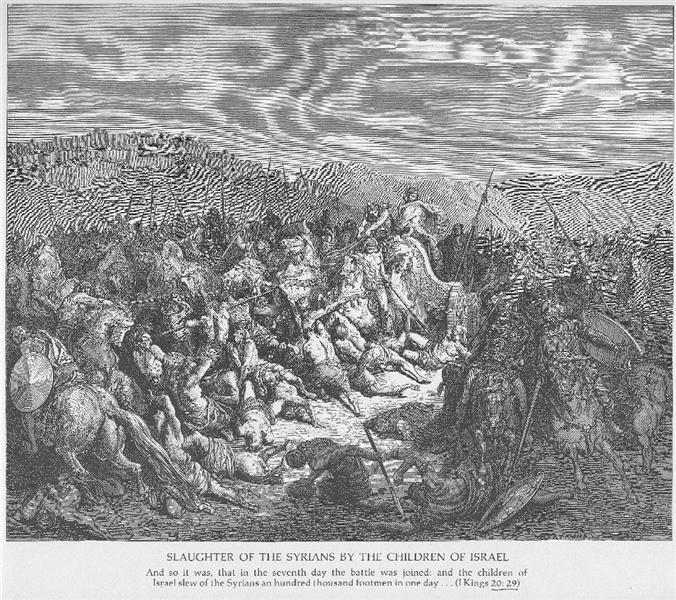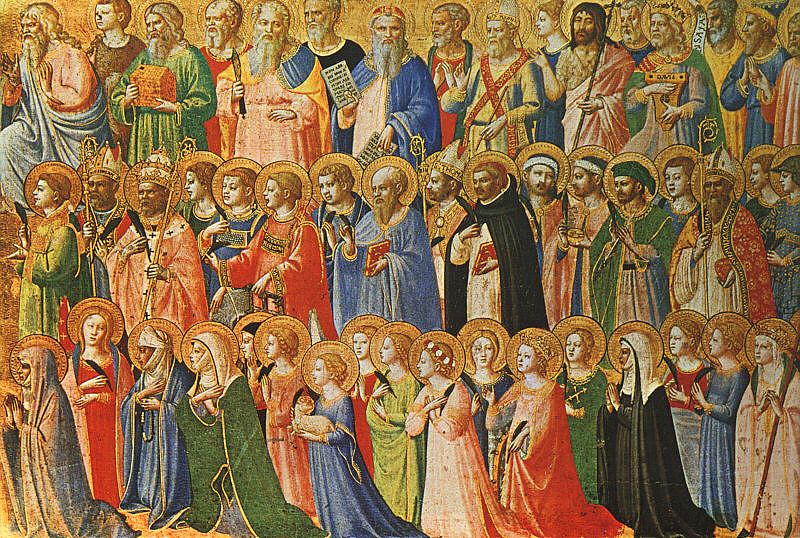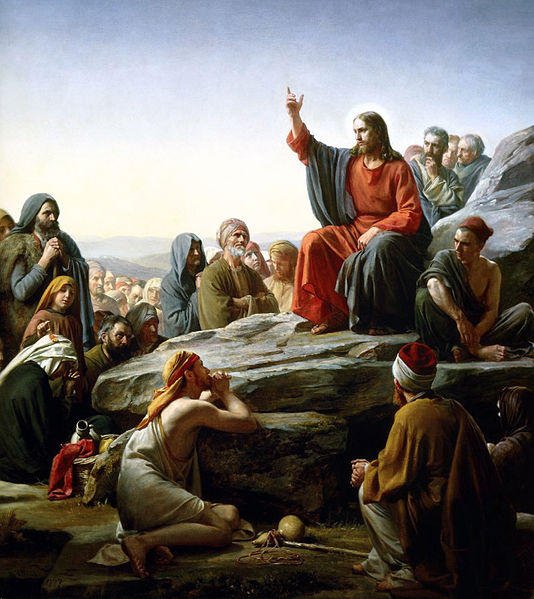Matthew 5:1-12 and Revelation 7:9-17
Pastor James Preus
November 5, 2023
Every one of us is living on the edge of eternity. No one knows when he will die, but we do know that our existence is not over when we die. God has endowed each of you with a living soul, which will live on even after your body dies. When you die, your soul will be separated from your body, and you will go either to heaven or hell. Yet, your soul will not remain separated from your body forever. Though your body rot away to dust, Christ will raise everybody from the dead, some to the resurrection of eternal life, others to the resurrection of judgment. Even as your soul enjoys paradise in heaven, you still wait for the resurrection of the dead (Rev. 6:9-11).
There is no end to heaven and there is no end to hell. Jesus describes hell as eternal punishment (Matthew 25:46), the outer darkness, where there is weeping and gnashing of teeth (Matthew 8:12; 22:13; 25:30), where their worm does not die, and the fire is not quenched (Mark 9:48). Jesus describes heaven as eternal life (John 5:29), Abraham’s bosom (Luke 16:22), the kingdom and the wedding banquet. Although the hope of the entire Scripture is to reach paradise, there are scant descriptions of heaven in Holy Scripture. Perhaps the most succinct description is in Psalm 73, where the Psalmist cries out to God “Whom have I in heaven but you? And there is nothing on earth that I desire besides you.” (vs25) Heaven, quite plainly, is to be with God our Savior.
Perhaps the most beautiful vision Scripture does give of heaven is found in Revelation chapter 7, where St. John sees a great multitude that no one can number from every nation, tribe, people, and language, standing before the throne of God and the Lamb with palm branches in their hands clothed in white robes singing praises to God. John is told that this multitude clothed in white robes are those who have come out of the great tribulation. They have washed their robes and made them white in the blood of the Lamb. They neither hunger nor thirst anymore, the sun does not strike them, nor any scorching heat. And God wipes away every tear from their eyes.
What a beautiful description of heaven! Whatever it lacks in detail, it more than makes up for with the promise of eternal contentment with Christ. The saints will be in Christ’s presence. Their suffering will be over. There will be no pain, anxiety, physical or emotional distress; not a tear of sorrow will ever be shed by them again! Rather, they will enjoy the presence of their Savior and God for eternity! And John recognizes this multitude as coming from every nation, tribe, and language. I have no doubt that each one of them could recognize each other, and that when you see this crowd in heaven, you will have no trouble recognizing your loved ones in Christ as well as many more, you never met on earth.
Yet, how will they come to such a blessed place after trudging through this tribulation here on earth? They washed their robes and made them white in the blood of the Lamb! Now obviously, blood does not make linen white. It stains it! But these robes are not linen, they clothe the souls of the saints. And our consciences can be washed clean in no other detergent than in the innocent, pure, and holy blood of Jesus Christ, the Lamb of God.
Yet, this is John’s vision. We have not seen it. We’ve only read it. For the time being, this vision is hidden from our eyes. We cannot see the white robes. The host of saints remains invisible, because faith is invisible. This is why we confess that the church by nature is invisible, because the church is the community of saints, who are saints through faith in Christ, a faith which abides in the heart.
Yet, that does not mean that we cannot recognize the Church here on earth. Christ has provided His Christians on earth with signs to recognize His Church. We call these signs the Marks of the Church. The marks of the church are the signs by which Christians can recognize where the true Church is. The marks of the church are the pure preaching of the Gospel and the right administration of the Sacraments. Where the Gospel is proclaimed that a sinner is saved through faith in Christ alone, who by His death made satisfaction for all our sins, there is Christ’s Church. Where sinners are baptized in the name of the Father, Son, and Holy Spirit for rebirth, forgiveness of sins, and salvation, there is Christ’s Church. Where Christ’s ministers in the stead and by the command of their Chief Shepherd forgive the sins of repentant sinners, there is Christ’s Church. Where Christ’s true body and blood are fed to the faithful in the Sacrament, there gathered is the multitude of white-robed saints.
How can I assert this? Because this is how the blood of the Lamb Christ Jesus is applied to our souls here on earth, so that they may be washed clean, so that we may stand faultless without spot or wrinkle before Christ our Savior on His throne. You cannot separate the marks of the church, Baptism, Absolution, the Lord’s Supper, and the preaching of the Gospel from the marks of Christ. Remember that Christ Jesus was wounded for our transgressions and crushed for our iniquities (Isaiah 53:5). It is by His stripes, His wounds that we are healed. The marks of the nails in Jesus’ hands and feet, of the spear in His side, of the lashes on His back, and of the thorns on His brow are revealed to us in the preaching of the Gospel and the administration of Christ’s Sacraments. There we get access to His sacred blood, which washes our sins away.
If you do not recognize the visible marks of the Church, then you cannot be a member of the church invisible, that great multitude of white-robed saints, whom no one can number. But when you recognize the marks of Christ in the marks of the church, you have confidence that you too are robed in a clean white garment and will join that multitude in heaven.
Yet, that is not what we see. As often as we hear the Gospel preached, as we believe the forgiveness of sins proclaimed to us, and eat Christ’s body and blood, our eyes cannot see the glorious vision St. John describes in Revelation seven. We don't see ourselves and our fellow Christians clothed in white robes, which guarantee an eternity of heavenly contentment with Christ. So, our gracious Lord Jesus, who is superabundantly generous in His grace, has given us additional signs here on earth. We can call them the marks of a Christian, or the marks of a saint. These are the signs which identify the saints here on earth. Saints are those set apart by God for eternal salvation.
“Blessed are the poor in spirit, for theirs is the kingdom of heaven.” Jesus says, “blessed nine” times in this Gospel lesson, which is why these sayings of Jesus are called the Beatitudes. The Beatitudes describe the marks of the saints. To be blessed means to have contentment in the Lord. Those who are blessed are those, who will come out of the great tribulation, wearing white robes before the throne of Christ in heaven. The first of those listed as blessed are the poor in spirit. The poor in spirit are those who do not store up treasures here on earth, where moth and rust destroy and where thieves break in and steal, but who store up treasures in heaven, where neither moth nor rust destroys and where thieves do not break in and steal. The poor in spirit long for nothing in heaven or on earth besides Christ their Lord and God. They take seriously Jesus’ warning, “What profits it a man, if he gains the whole world, but forfeits his soul?” These poor in spirit possess the very kingdom of heaven for eternity.
Those who mourn over their sins and the attacks of the devil, world, and sinful flesh against Christ’s Church instead of rejoicing with the unbelieving world will be comforted with comfort no alcohol, drug, or fancy feast can give. They will be comforted by the Father of all mercies and God of all comforts with a consolation, which will never end. The meek, who confess with Martin Luther, “We are beggars; this is true,” will inherit the earth. The meek gain very little in this life. But in the kingdom of heaven, it is the humble who are exalted and those who exalt themselves who are humbled. The Psalmist promises, “Wait for the Lord and keep his way, and he will exalt you to inherit the land.” (Psalm 37:34) The meek are those who receive from the Lord by grace as a gift through faith. They will indeed inherit the new heavens and the new earth.
Those who hunger and thirst for righteousness will be blessed, because they will be satisfied. John tells us that they will hunger and thirst no more. Not only will they not hunger and thirst for food and drink, but they will no longer be lacking in the righteousness of a saint. In this life, we live as justified sinners. We are declared righteous through faith, but we still struggle with sin. In heaven, our greatest desire will be satisfied. We will sin no more! We will dwell in perfect love and harmony with God and one another.
The merciful are blessed, because they will receive eternal mercy from God. As God forgave them in Christ, so they forgive those who have sinned against them. Every time a saint forgives the one who sins against him, he confesses that God has forgiven him in heaven. The pure in heart are those who hold Christ in faith. They will see God, because they will be like Him. The peacemakers are called sons of God, because God is a peacemaker. Like a father, so are his children. Peacemakers proclaim the Gospel that God is at peace with us for the sake of Christ’s shed blood. And peacemakers seek to be at peace with everyone for the sake of that blood.
Finally, the saints are blessed, because they are persecuted for righteousness’ sake. They suffer for holding to Christ’s teaching. This is perhaps the most painful mark to bear, yet it gives the clearest sign to the Christian that he is blessed in heaven. To suffer in this life, to be maligned, insulted, and even beaten or killed for confessing the truth puts you in good company with the prophets, apostles, and especially with Christ Jesus your Savior. Jesus said, “whoever would come after Me, let him deny himself, take up his cross, and follow Me.” The cross of persecution is a clear sign of heavenly blessedness.
Yet, it is important to note that none of these marks of a saint can be separated from the marks of the church, otherwise, they are separated from the marks of Christ! The unbelieving world, who hates Christ, will try to ascribe these marks of a saint to unbelievers, who perform noble works in this life and even suffer for them. But there is no mark of a saint without faith in the marks of Christ, that is, without faith in Christ’s shed blood for you. And so, there is no mark of a saint without the marks of the church, which apply Christ’s blood to you. The purpose of the marks of the saints is to give encouragement to Christ’s Christians while they go through the great tribulation here on earth. You are not forgotten. Your poverty and meekness are Christ’s poverty and meekness. Your hunger is His hunger. Your suffering is Christ’s suffering. And so, when the marks of a saint accompany Christians as they use the marks of the church, Christ’s saints are comforted even on earth by the marks of Christ. Amen.



 RSS Feed
RSS Feed